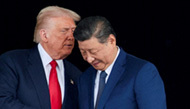As Bush Term Wanes, Mideast Peace Is an Elusive Goal

President Bush’s hopes for getting Israelis and Palestinians to agree to a deal is facing numerous obstacles.
By SHERYL GAY STOLBERGWASHINGTON - The 2008 race for the White House is casting a long shadow over President Bush. So long, in fact, that it may extend all the way to the Middle East.
When Israeli and Palestinian leaders committed themselves to peace talks after meeting in Annapolis, Maryland, last November, Bush had hopes of ending his presidency on a foreign policy high note, with a deal for the contours of a Palestinian state. But with Mr. Bush in the region this month for the second time in five months, peace seems as elusive as ever - and some are looking to his successor.
“In some ways, this is the roadshow cast of ‘Waiting for Godot,’ said Anthony H. Cordesman, a Middle East expert at the Center for Strategic and International Studies in Washington. He said the trip would “basically set a marker while everybody waits for the next president, while other analysts predicted the most Mr. Bush could accomplish would be to hand over a working peace process to his successor. The five-day trip was scheduled around the 60th anniversary of Israel’s founding on Thursday, but was also to take Mr. Bush to Saudi Arabia and Egypt. For the White House, the timing is hardly ideal.
Israel’s prime minister, Ehud Olmert, is embroiled in a criminal investigation that threatens his job. The Palestinian president, Mahmoud Abbas, left Washington disappointed after a recent meeting with Mr. Bush. Although the peace talks continue, the two sides are far apart on the core issues that divide them, and the White House press secretary, Dana Perino, has said progress is “more halting than Mr. Bush would like.
The talks are so tenuous that even Stephen J. Hadley, Mr. Bush’s ever-optimistic national security adviser, conceded there was little reason for the three leaders to get together.
“This did not seem the time for a big high-level three-way event with the president and the prime minister and President Abbas,’’ Mr. Hadley said. “It just doesn’t feel right as the best way to advance the negotiations.
Jon B. Alterman, the director of the Middle East program at the Center for Strategic and International Studies, offered an especially bleak assessment.
“It’s hard to remember a less auspicious time to pursue Arab-Israeli peacemaking than right now, Mr. Alterman said. “The politics on the ground are absolutely miserable. U.S. power and influence are at low ebb in the region. The Bush administration is beset by challenges - the combination of a faltering economy, persistent difficulties in Iraq and a growing threat from Iran - all at a time that the president’s popularity is at a historical low, and his administration is settling more and more into lame duck status.
Mr. Hadley, the national security adviser, characterized the visit as “both symbolism and substance, and said Mr. Bush would use his time in the region to try to prod the parties along.
Few presidents have been as closely allied with Israel as Mr. Bush, and experts say many Israelis worry that the next president will not be nearly so sympathetic. But Arabs across the region are looking past Mr. Bush with a hopeful eye - particularly if his successor is a Democrat, said Aaron David Miller, a longtime Arab-Israeli peace negotiator who worked for the first Bush administration and the Clinton administration. Mr. Miller said countries like Syria, which Mr. Bush has branded a state sponsor of terrorism, were hopeful that a new administration would be more willing to engage.
“If the Democrats come in after eight years, there will be a lot of new ideas, a lot of new enthusiasm to look at the Middle East in a different way, with more engagement, more diplomacy, Mr. Miller said .
Like most second-term presidents in their final year in office, Mr. Bush is spending considerable time on the road; the Middle East trip is one of eight foreign trips on his agenda for 2008. With a Congress controlled by Democrats and his agenda on Capitol Hill reduced to issuing veto threats, it may be no wonder that he wants to get away. Historians say overseas travel can give presidents both a political and a psychological boost.
“They hope they can get some kind of significant advantage, emotionally, personally, said Robert Dallek, the presidential biographer. “They want a sense of being in charge, of being in control, of having some impact on something.
Bruce Buchanan, a professor of political science at the University of Texas at Austin, said even the slightest bit of good news could be a plus for the president.
“He’s not going to turn around his presidency or anything like that, Mr. Buchanan said. “But what he might do is bump his numbers a little bit and get people to acknowledge that this guy is trying to serve the public interest.
스마터리빙
more [ 건강]
[ 건강]이제 혈관 건강도 챙기자!
[현대해운]우리 눈에 보이지 않기 때문에 혈관 건강을 챙기는 것은 결코 쉽지 않은데요. 여러분은 혈관 건강을 유지하기 위해 어떤 노력을 하시나요?
 [ 건강]
[ 건강]내 몸이 건강해지는 과일궁합
 [ 라이프]
[ 라이프]벌레야 물럿거라! 천연 해충제 만들기
 [ 건강]
[ 건강]혈압 낮추는데 좋은 식품
[현대해운]혈관 건강은 주로 노화가 진행되면서 지켜야 할 문제라고 인식되어 왔습니다. 최근 생활 패턴과 식생활의 변화로 혈관의 노화 진행이 빨라지고
사람·사람들
more
[‘파친코’ 이민진 작가,인터뷰] “이민자와 취약계층 보호해야”
재미 한인 작가 이민진(57)씨가 새해 1월1일 뉴욕시장으로 취임하는 조란 맘다니(34) 뉴욕시장 당선인에 대해 “맘다니 시장이 긍정적인 변화…

김응화무용단, LA 카운티 연말축제서 ‘화관무’
김응화무용단이 지난 24일 열린 LA 카운티 연말 문화행사 제66회‘할러데이 축제’ 무대에 초청돼 한국 전통무용 ‘화관무’를 선보였다고 밝혔다…
이민단속·산불 영향 LA카운티 인구 감소
LA 카운티 인구가 올해 상당수 감소한 것으로 나타났다. 캘리포니아 주 재무국이 최근 발표한 자료에 따르면 올해 7월1일 기준 LA카운티의 인…
한인 2세, 드라마 ‘런’ 주연 맡아
권호열 세계무술총연맹 총재의 아들 에릭 권씨가 주연하는 드라마 ‘런(RUN)’ 시사회가 지난주 버지니아 애쉬번 소재 리걸 폭스 극장에서 열렸다…
[송년 행사] 코윈 퍼시픽 LA
한민족 여성네트워크(KOWIN) 퍼시픽 LA(회장 조미순)는 23일 LA 용수산에서 2025년 송년회를 열었다. 이날 행사에는 가정폭력 피해 …
많이 본 기사
- [새해 달라지는 교통법규] 과속·음주운전 처벌 가주서 대폭 강화
- 신년 연휴에 또 비 이번주 ‘강풍주의보’
- 진보 간판 샌더스 “부유한 자들이 AI 밀어붙여” 쓴소리
- 영주권자도 생체정보 전면 확인
- 401(k) 백만장자 50만명 돌파… 시간·복리 투자 ‘결실’
- ICE 단속 전략 전환… ‘현장 체포’ 급증
- 이민자 트럭 운전사들 “면허박탈 위법” 소송
- 트럼프 관세… 와인 시장도 ‘휘청’
- ‘AI 대부’ 제프리 힌턴 “오픈AI·메타, AI 안전보다 이익 중시”
- 세밑의 단상(斷想)
- 2025년의 최대 패배자(Loser of The Year 2025)는?
- [메건 매카들 칼럼] 역차별 당하는 젊은 백인 남성들
- 겨울 모서리
- Rise of Amazon
- ESPN “애틀랜타, 김하성 영입으로 가장 큰 약점 메웠다”
- [만화경] 봉황의 청와대 귀환
- 정용진 신세계그룹 회장 “비상할 준비… 1
- 5 Fwy 다중추돌 참사 1명 사망·15명 부상
- 트럼프 정부, 이민 2세대까지 공격
- Youth Voice Matters: Good Health and Well-Being
- [2025년 주요 경제이슈] “트럼프발 혼돈… 금·AI는 높은 수익”
- 북동부 3년만에 최대 폭설 ‘항공대란’
- LA시 아파트(1978년 이전 건설) 렌트비 연 4% 이상 못 올린다
- 트럼프, 4주년 앞둔 우크라전 終戰불씨 살리나…진전·한계 병존
- 은값 77달러 돌파, 역대 최고치 행진
- 배관 시설 사용 느는 연말… 갑작스러운 고장 피하려면
- 특검 “김건희, 장막 뒤에서 불법 국정개입…尹과 정치공동체”
- 한 해 아이들이 가장 많이 흔들린 순간들은
- 미국이 K-푸드 주력시장… 중국 제치고 1위 부상
- “북한, 훔친 암호화폐 규모 최소 60억달러 달해”
- 김응화무용단, LA 카운티 연말축제서 ‘화관무’
- CJ, 미국서 전통주 문화 확산 나서
- “해외 소포 파손·폐기·배송지연 속출”
- ‘빅테크’ 투자자 독식 액티브펀드 대거 이탈
- ‘황희찬 침묵’ 울브스 리버풀에 져 11연패
- [화제 기업] 회사 팔리자 해고 대신 ‘44만달러’ 보너스
- 1차 조기전형 ‘합격 유예’ 받았다면… 입시 전략 재검토 기회
- A World of Voices
- “빅테크, AI 부채 1,186억달러 장부서 제외”
- 엔비디아, 기술계약으로 규제 회피
- 장거리 여행 중에도 입시 준비… ‘오디오북·교육앱·팟캐스트’로
- [‘파친코’ 이민진 작가,인터뷰] “이민자와 취약계층 보호해야”
- 지메일 주소변경 가능 구글, 앞부분 새 설정
- 올해 미 기업 파산 신청 증가
- 건강한 노년을 위한 식사법, 무엇을 어떻게 먹어야 할까
- 연말에 일가족 5명 숨진 채 발견… 경북서 손자·조부까지 3대 ‘비극’
- [2025 유통 결산 ①온·오프커머스] 쿠팡에 발등 찍혔지만 온라인 강세… 대형마트는 ‘고전’
- 캐스테익 지역서 대형 가스관 폭발 누출
- 브리짓 바르도 별세 왕년의 스타, 91세로
- 가주 고속철 재정계획 ‘궤도 수정’
1/5지식톡

-
 미 육군 사관학교 West Poin…
0
미 육군 사관학교 West Poin…
0https://youtu.be/SxD8cEhNV6Q연락처:wpkapca@gmail.comJohn Choi: 714-716-6414West Point 합격증을 받으셨나요?미 육군사관학교 West Point 학부모 모…
-
 ☝️해외에서도 가능한 한국어 선생님…
0
☝️해외에서도 가능한 한국어 선생님…
0이 영상 하나면 충분합니다!♥️상담신청문의♥️☝️ 문의 폭주로 '선착순 상담'만 진행합니다.☎️ : 02-6213-9094✨카카오톡ID : @GOODEDU77 (@골뱅이 꼭 붙여주셔야합니다…
-
 테슬라 자동차 시트커버 장착
0
테슬라 자동차 시트커버 장착
0테슬라 시트커버, 사놓고 아직 못 씌우셨죠?장착이 생각보다 쉽지 않습니다.20년 경력 전문가에게 맡기세요 — 깔끔하고 딱 맞게 장착해드립니다!장착비용:앞좌석: $40뒷좌석: $60앞·뒷좌석 …
-
 식당용 부탄가스
0
식당용 부탄가스
0식당용 부탄가스 홀세일 합니다 로스앤젤레스 다운타운 픽업 가능 안녕 하세요?강아지 & 고양이 모든 애완동물 / 반려동물 식품 & 모든 애완동물/반려동물 관련 제품들 전문적으로 홀세일/취급하는 회사 입니다 100% …
-
 ACSL 국제 컴퓨터 과학 대회, …
0
ACSL 국제 컴퓨터 과학 대회, …
0웹사이트 : www.eduspot.co.kr 카카오톡 상담하기 : https://pf.kakao.com/_BEQWxb블로그 : https://blog.naver.com/eduspotmain안녕하세요, 에듀스팟입니다…
케이타운 1번가
오늘의 1면
오피니언
 옥세철 논설위원
옥세철 논설위원2025년의 최대 패배자(Loser of The Year 2025)는?

세밑의 단상(斷想)
 메건 매카들 워싱턴포스트 칼럼니스트
메건 매카들 워싱턴포스트 칼럼니스트 [메건 매카들 칼럼] 역차별 당하는 젊은 백인 남성들
 조형숙 시인·수필가 미주문협 총무이사
조형숙 시인·수필가 미주문협 총무이사 겨울 모서리
 한영일 / 서울경제 논설위원
한영일 / 서울경제 논설위원 [만화경] 봉황의 청와대 귀환

새해 더 중요해지는 노동법 준수

연말연시, 안전하고 차분하게
 캐슬린 파커 워싱턴포스트 칼럼니스트
캐슬린 파커 워싱턴포스트 칼럼니스트 [캐슬린 파커 칼럼] 지미 라이의 마지막 희망
 유경재 나성북부교회 담임목사
유경재 나성북부교회 담임목사 [한국춘추] 미국의 힘
1/3지사별 뉴스

물류거점창고에 불체자 8만명 수용 추진
도널드 트럼프 행정부가 이민자 구금·추방을 효율화하기 위해 전국 물류거점 창고에 8만명 규모의 수용시설 확보를 추진한다고 24일 워싱턴 포스트…
‘학자금 상환’ 안하면 임금압류

“온 세상에 희망·평화의 빛 스며들길”
가자지구와 우크라이나에서의 전쟁, 고립과 불평등으로 세상이 어지러운 가운데 워싱턴 지역 각급 한인교회와 성당들이 성탄절을 맞아 일제히 예배와 …
“연말은 스트레스·새해 결심은 없다”

“올해 최고 주목받은 테크 거물은 머스크 아닌 래리 엘리슨”
올해 미국에서 가장 주목받은 기술업계 거물은 일론 머스크 테슬라 최고경영자(CEO)가 아닌 래리 엘리슨 오라클 창업자·회장이라고 블룸버그 통신…
[새해부터 이렇게 달라진다] 최저임금 또 오르고… 유급 병가는 더 확대

오늘 하루 이 창 열지 않음 닫기 



















































.png)


댓글 안에 당신의 성숙함도 담아 주세요.
'오늘의 한마디'는 기사에 대하여 자신의 생각을 말하고 남의 생각을 들으며 서로 다양한 의견을 나누는 공간입니다. 그러나 간혹 불건전한 내용을 올리시는 분들이 계셔서 건전한 인터넷문화 정착을 위해 아래와 같은 운영원칙을 적용합니다.
자체 모니터링을 통해 아래에 해당하는 내용이 포함된 댓글이 발견되면 예고없이 삭제 조치를 하겠습니다.
불건전한 댓글을 올리거나, 이름에 비속어 및 상대방의 불쾌감을 주는 단어를 사용, 유명인 또는 특정 일반인을 사칭하는 경우 이용에 대한 차단 제재를 받을 수 있습니다. 차단될 경우, 일주일간 댓글을 달수 없게 됩니다.
명예훼손, 개인정보 유출, 욕설 등 법률에 위반되는 댓글은 관계 법령에 의거 민형사상 처벌을 받을 수 있으니 이용에 주의를 부탁드립니다.
Close
x